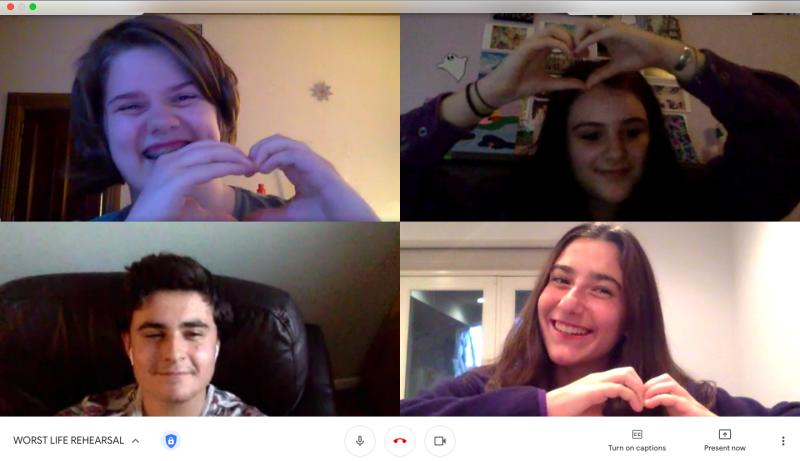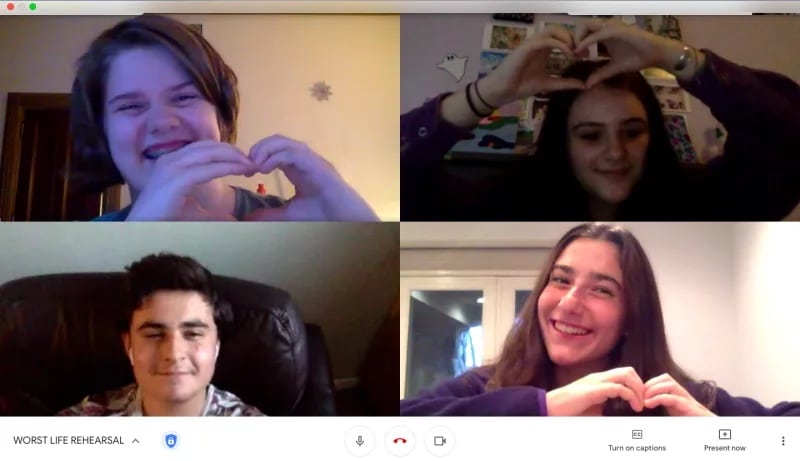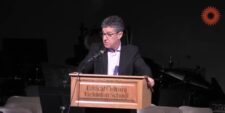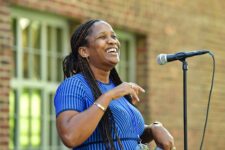On a Monday afternoon, six Fieldston Upper students are meeting to rehearse their production of “Safer” for the first Studio Theatre Series (STS) of the year. After an invigorating warm-up led by actor Ben M. ’21 (“Breathe out the day. We’re here, we’re at rehearsal, it’s fun,” he says), Assistant Director Sarafina B. ’22 leads a discussion of each character’s interior life during a scene. The actors talk about their characters’ motivations, desires, goals, and how they’ll convey those concepts. They mention gestures and other physical expressions, or using the dynamics of their voices.
It’s time to run through the scene in question, and the actors ready themselves. The scene begins, and immediately, the tension of the moment becomes clear. The actors — now fully immersed in their characters — lean in and away from each other, throw their hands up in frustration, and bury their heads in their hands. Alliances shift between the characters rapidly, and the actors play off each other with expertise.
While it sounds like a normal rehearsal as opening night inches closer, it’s actually anything but: The students are all calling in from their homes around the city, rehearsing remotely.
The students are performing “Safer,” a play about high school students on a video call during the pandemic, trying to finish a petition for a school community service project. Things get complicated when the group gets sidetracked trying to help a member they think is in distress. The play grapples with the “consequences of getting a glimpse into people’s homes and how safe the spaces are we’re creating to stay safe from the pandemic,” director Thomas G. ’21 says. “Sometimes it’s not always clear who has the moral high ground.”
As the scene ends, Thomas addresses the group. There are only nine rehearsals left, he says, and the pressure is on. “The level of focus that we’re going to have to bring to the next nine days is important,” he says, but he adds, “Put that pressure on me,” offering to serve as a support system. “The next nine rehearsals are going to be the time to really start putting in the work, and I am convinced it’s going to be great.”
The Ethical Culture Fieldston School’s robust Theatre program is adapting to an out-of-the-ordinary year with inventive and creative takes on performance. Since the typical mainstage productions were no longer feasible, the Theatre Department reallocated resources toward STS.
STS is a program led by students who have “emerged over four years as leaders in the department,” Clare Mottola, Theatre and Dance Department Chair, says. The student directors have more often than not taken a course in theatre directing, as well as a variety of other performance and production classes. In order to be an STS director, students go through a rigorous application process. “They have to engage in a lot of deep thinking about material and craft, script analysis, and production logistics before they’re even chosen to direct. We need to make sure these kids can lead a company,” Mottola says.
Once student directors are chosen, they lead two days of auditions to cast their actors. In addition to holding rehearsals, they also meet weekly with their production team and with the other student directors.
This year, the Theatre Department commissioned three playwrights to write productions that would be performed entirely over video. “Safer,” written by Allison Flom ’12, will run from October 29 to October 30, 2020; “The Worst Life I Ever Lived,” written by Ryan Drake and directed by Zach C. ’21, will run from November 13 to November 14, 2020; and “Know the Downbeat,” written by K’yana Faulkner-Smith and directed by Rachel H. ’21, will run from February 5 to February 6, 2021. “Crooked” — written by Catherine Trieschmann and directed by Aidan L. ’21, and the only play not commissioned by ECFS — will run from April 30 to May 1, 2021.
For the playwrights, “the task was to figure out how to best utilize technology and use it in our favor,” Mottola says. The writers and directors spent time together in the spring and summer, collaborating and generating ideas. It was an exciting project, Mottola says, given the “whole new modality for telling theatrical stories.”
It’s Tuesday, and another cast is meeting to rehearse their production. “The Worst Life I Ever Lived” is about three teenagers whose lives are thrown for a loop when a beloved local store is sold to a mysterious corporation. The production wrestles with heady themes: control, consumerism, corporate power, what we trade for convenience and efficiency, and materialism versus interpersonal connection.

Director Zach C. takes the actors through a pass of a section they’ve yet to run through in full. They make a plan: Even on camera, there are blocking, physical shifts, and costume changes to address. Some actors are visibly nervous, but Zach calms them down. “There’s going to be lots of stopping and confusion,” he says, “but we’re going for a bigger-picture understanding of what’s going on. Don’t freak out! It’s not a performance; it’s a rehearsal.”
The scene begins with instant vitality. There’s a constant flow of dialogue, characters talking over each other as they grow more and more impassioned, location changes, moments of heightened anxiety, expertly delivered comedic lines, and even a cowboy hat.
The scene comes to a close, and Zach invites the cast to give their reactions before he offers his. They’re hard on themselves, saying they felt their energy level was low. (Observers from the production team did not agree.) Zach urges them to memorize their lines sooner rather than later, noting that having to look down at a script automatically brings the energy level down. He makes the cast laugh, and the energy starts to lift. They dive back in.
Trust and connection are key to any performance, and removing the in-person component presents a challenge. Luckily, the student directors have a plan for that. “Finding a community to connect with in theatre has always been one of the most important elements of the discipline to me,” Thomas says, “so I felt it was very important to take steps to build community, whether through rehearsal rituals, sending long texts after rehearsal that the cast makes fun of me for, or making clear it’s a place to have fun. I think everyone is really searching for ways to connect right now, so all it takes is a little push in the right direction and a little setting of the tone to make it pretty easy.”
Zach focuses on bringing people out of the school day and into a collaborative space. He starts each rehearsal with a drawing game that “allows people to just take a deep breath and let go of the stress of the day.” He also creates an environment of conviviality: “We are able to laugh with each other over Google Meet after a long day of sitting in front of a screen. We laugh at each other’s terrible drawings,” he says.
“Transparency and talking a lot about backstory, as well as getting to know each other, has made it easier for us to connect emotionally,” says Rachel Y. ’24. Logan F. ’23 points out that much of the cast had worked together before and could rely on previously established relationships. “It was like reuniting for summer camp,” she says.
“To my surprise, I have gotten super-close to the people in this production, even though I haven’t even met all of them yet,” says Carson L. ’22. “Zach has had us play some fun games together before rehearsal starts, which I actually think brings us closer together. We are all in the same boat — we have never done something like this before — so I think that also in a sense brings us closer.”
We all know that this is a space where we don’t have to worry about schoolwork and can just be present and exist with each other.
Technology proved to be an uphill battle at first, Zach says. Consider the tools available on stage: lighting, props, set pieces, and the backstage crew who help bring those pieces together. On screen, “you have to do that all by yourself as an actor,” Zach says. Actors also don’t get the feedback of looking into each other’s eyes, making the emotional connections they foster all the more important. And because of the slight delay that happens on video calls, actors have to speed up the dialogue to avoid gaps: To an audience, the dialogue is seamless, but to the actors, it’s a stream of overlapping interruptions. “It was a struggle a bit at first, but I think we have definitely made the most of the process,” says Charlie M. ’21. “I think that once we really got used to how rehearsal would go and the tech involved, it got much easier.”
Another challenge (“Besides directing the first-ever virtual show at Fieldston — the first show I’ve ever directed — where at every turn there’s a new aspect of adapting to a virtual performance that I’ve never even considered?” Thomas deadpans) is time. The productions must operate on a compressed timeline, with Safer only having about a month of rehearsals. It’s a logistical hurdle, but also an emotional one, says Thomas: “I just really wish I had more time with this most incredible group of people.”
Something that doesn’t change, though — whether students are remote or in person — is the critical outlet the arts give. “We all know that this is a space where we don’t have to worry about schoolwork and can just be present and exist with each other to try to create a whole new experience for ourselves and the whole Fieldston community,” says Ines M. ’22.
For any of the challenges the students have faced with their STS productions this year, there have been equal opportunities for growth and creative breakthroughs. According to Zach, “This is an incredibly difficult process, but it’s also incredibly rewarding.” Julia P. ’21 adds that it’s a relief to simply be together: “At first, I was upset because I thought there would be no theatre at all for my senior year, so just the fact that this show is happening at all is so exciting!”
The fact that kids are showing up and creating together feels so powerful.
“What eight months ago felt like a super-daunting reality has really become good fortune,” Mottola says. “What we lose with live theatre — it’s an incredible breadth and depth of loss. But the ways in which these playwrights and directors generated this material and ideas — it’s really exciting. It’s an incredible gain.”
Most importantly, the students have proven they can rise to the occasion, regardless of the challenges. “The fact that kids are showing up and creating together feels so powerful,” Mottola says. “It’s powerful for the community to come together.”



